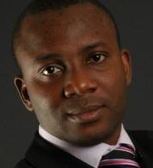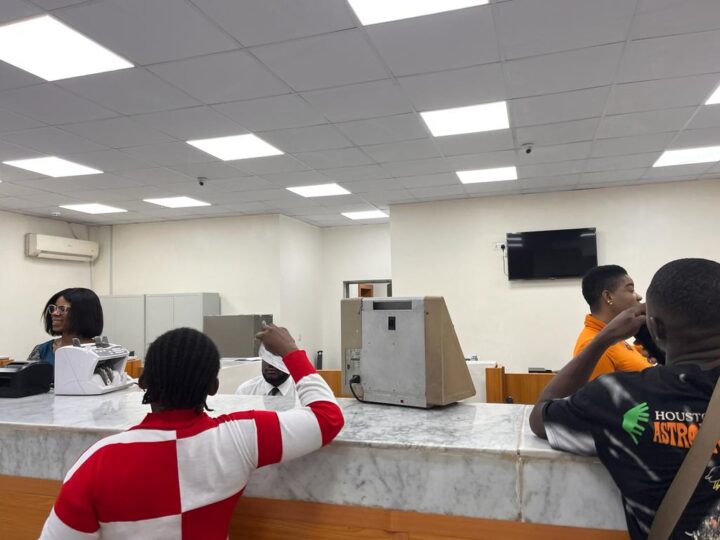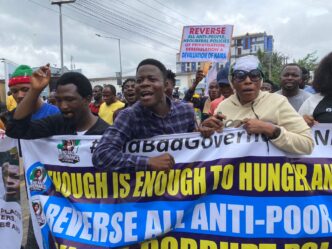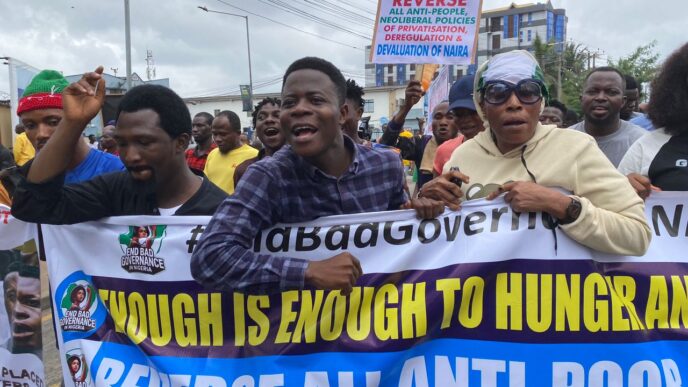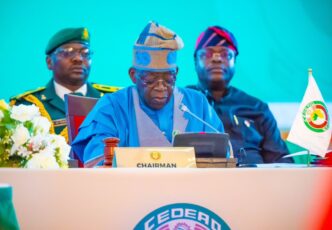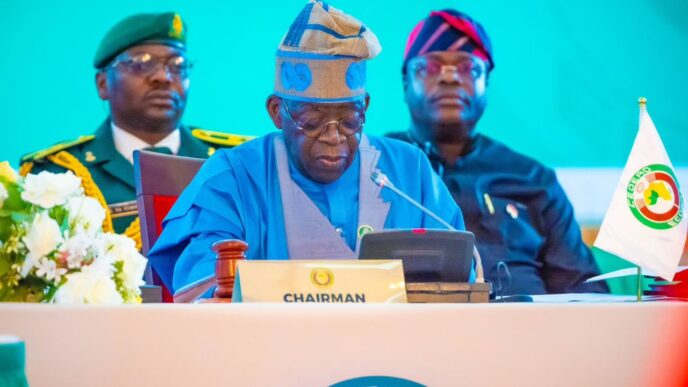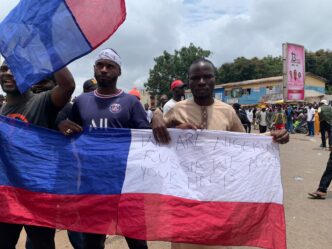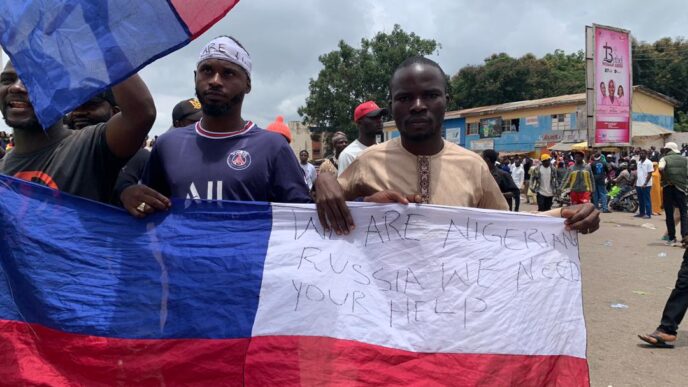Protesters at the #EndBadGovernance demonstration in August 2024
I have always wondered why some erstwhile good people go into politics, accept political appointments, and come out changed. I have also wondered what goes on in the minds of our political leaders. For instance, how do they see leadership and governance? Are they concerned about the people? The search for answers has somehow turned me into a political anthropologist.
Of course, some political leaders are outstanding. They are other-oriented and genuinely interested in the welfare of their people. They go out of their way to make this happen. Their legacies speak for them. However, many are selfish, narcissistic, and self-centred and feed on the ignorance of the poor masses and sycophants who prop them up. Ironically, they are only what they are because the masses empower them.
Take the concerns about the high cost of governance, one of the trending issues in Nigeria today, for example. Having observed the political class both closely and from a distance, it seems that the masses are at the root of Nigeria’s high cost of governance. I will tell you why.
I have had the experience of an ex-prime minister as a colleague. His lifestyle was very simple. He lived in an average apartment and cycled to school. He was not treated in any special way by us, his colleagues. Not that he expected it. But even if he did, he wouldn’t get it. This was in Europe.
Advertisement
Having lived in Europe for decades, I have always been struck by the freedom it offers the average citizen. I am not talking about the usual freedom of being able to do the things you want to do or the unfreedom associated with poverty. Instead, I am talking about the freedom to be oneself irrespective of colour, ethnicity, faith, and sexual orientation. Although you see the odd racial attacks, those are largely in the minority. No one cares as long as you don’t intend to harm others or yourself.
That’s why when some of our big men and women are in Europe, they blend in unnoticed. No bodyguards. No fanfare. No convoys. No noise.
If you are a politician in a society like this, where who you are and what you are rarely counts, there is almost no incentive to ask to be noticed. There is also no need or pressure to impress because this society is a leveller.
Advertisement
The other thing that helps is that there is no apparent competition to be the wealthiest and most powerful in a community. There are no kinsmen and women to impress or oppress. Society has found a way to provide basic amenities. The unemployed are placed on benefits. People with disabilities are taken care of. No one is a burden to anyone because society takes care of all.
For instance, in Scotland, where I live, education is free from kindergarten to university. So, there is no excuse for being out of school. Moreover, it is compulsory to be in education until one becomes an adult. When a child stays out of school for no genuine reason, the parents risk being punished or the child taken away from them by social services. Healthcare is also free.
However, these free services are partly made possible by high taxes. Although the tax system is equitable, it seeks to ensure value for money. This way, people do not grumble to pay taxes and leverage it to hold their politicians accountable. As such, it is difficult to sway any voters with the lure of the stomach infrastructure. That’s the nature of democracy in many advanced economies. Even though they are not perfect and are a work in progress, in my opinion, they offer more human freedom than many African countries.
For instance, although it takes about 6 hours to fly directly between Lagos and most European cities, the difference in maturity and relevance between their political and socio-economic institutions is about 600 years apart. So, each move in either direction comes across as time travel. Either you are going back in time (i.e., travelling to Lagos) or forward in time (i.e., travelling to European cities). A successful back-and-forth would require appropriate mental and psychological calibrations and adjustments.
Advertisement
When you eventually land in Nigeria, the scenario is very different. Poverty is rife. Unemployment is high. Insecurity is nigh. As such, the few well-to-do people, made by hook or crook, are the centres of attraction. Everyone wants their attention. They control a lot of resources and command a lot of power.
They have large followers who want one or two favours from them. They like to be visible and known in their communities. It gives them joy. They also like to be consulted before any significant decisions are taken. It keeps them cool in the Gen Z world. As far as politics is concerned, either they are calling the shots themselves or propping their stooges as kingmakers. Either way, they are in charge.
The recognition society accords them has made them inglorious role models. They are literarily celebrated. They feed a multitude and require constant supplies to maintain their status. That’s why corruption is the order of the day, and no one is bothered. Corruption has been normalised, and no one cares about how riches are made. But does it matter? The truth of the matter is that everyone is waiting for their time to have a bit of the proverbial national cake.
So, it is only a matter of time and opportunity. That’s why the few rich people have a lot of people milling around them, waiting for the right time and opportunity to seize the moment, which could be a juicy business contract or political appointment. And when they make it big, the masses hail them.
Advertisement
Nonetheless, these options are not cheap. Getting a juicy business contract or pursuing a political appointment costs a lot. They are pure investment decisions which should come with commensurate profit. Eventually, they work hard to recover their vast investments when they secure a business contract or political appointment. That’s why the cost of governance is high. We have also normalised it.
But have you stopped to wonder what life would look like for some of our big men and women if they had no one to fan the ambers of their tremendously massive egos? What incentives would they have to amass wealth for personal aggrandisement? What use is wealth if it is not recognised, worshipped and celebrated? This is often the missing jigsaw in the quest for reduced governance cost.
Advertisement
The other truth is that big men and women are nothing without the masses. The recognition the masses offer them is the oxygen sustaining their rapacious propensity to amass wealth rightly or wrongly.
Obviously, recognition is a psychological reward. We enjoy it. It takes a poor person to fashion a wealthy person because a wealthy person is only wealthy in comparison. Without the poor, no one is wealthy. The rich amongst us understand this. To maintain their status quo, it is in their interest to keep the masses impoverished and offer them peanuts occasionally to secure their loyalty. That’s the misery of poverty.
Advertisement
The masses have power and can use it if empowered. And one way to empower them is to fight poverty head-on.
If the masses want to lower the cost of governance, they should also be prepared to withdraw such undue recognition accorded to stolen common patrimony by some of our politicians and public officeholders. If one is in an environment where no one cares about the size of your house or car, the tendency to de-emphasise them would be high, and the tendency to steal to impress would be low.
Advertisement
But to achieve this, the masses should be genuinely independent and free. That’s what it means to live in a progressive society. And the freedom of the masses is the most significant challenge.
However, freedom is everything worth living for. That’s why the masses must bite the fingers that feed them to earn their freedom!
Prof Amaeshi is a public philosopher, professor of sustainable finance at the European University Institute, Italy, and Chair in business and sustainable development at the University of Edinburgh, United Kingdom. He tweets @kenamaeshi.
Views expressed by contributors are strictly personal and not of TheCable.
